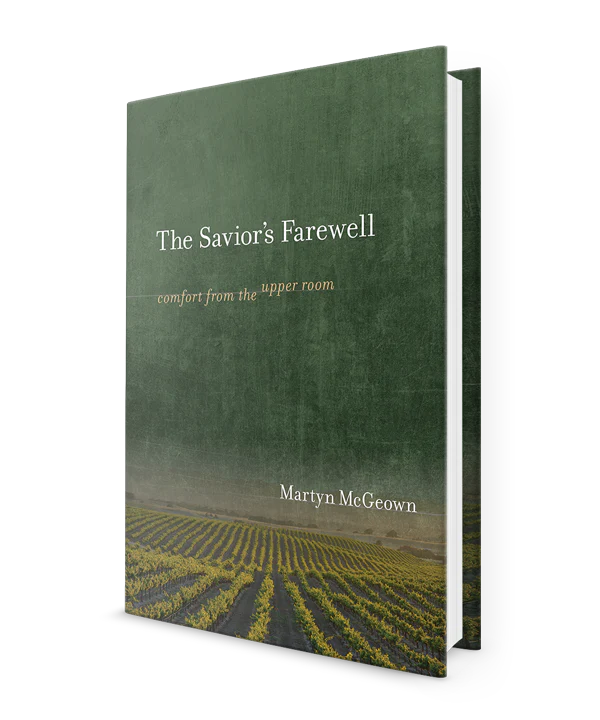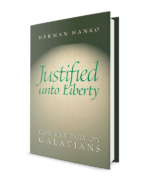On the night before He was betrayed, Jesus ate His last meal with His disciples. The heavy weight of the cross bore down on Him, yet His focus lay not on His own suffering, but on His imminent departure and what this meant for His disciples.
The Upper Room Discourse of John 14–16 records the words of great comfort Christ gave His disciples. He must indeed go away from them. But by doing so Jesus would bridge the gap between creature and Creator; between earth and heaven; and between sinners and the holy, just God. Christ is the way to the Father, and it was only through the way of the cross and His resurrection and ascension that His people could be reconciled to the Father, and receive the Comforter and life.
With clear and pastoral applications to the church today, Martyn McGeown leads us into the upper room to hear Jesus’ instruction alongside the disciples. It is in the upper room that we receive Christ’s exhortations and encouragement, heed His warnings, and appropriate His comfort through faith.
BOOK REVIEW
By Rev. Wilbur Bruinsma
Another excellent work by author Martyn McGeown. It is not a biblical/historical narrative as it may seem since it explains an event that took place in the upper room with Jesus and his disciples the night of his arrest and subsequent death. This book is, rather, an exposition of one of the most difficult discourses of Jesus recorded for us in the gospel accounts. Few writers would tackle a detailed explanation of it. Chapters 14-16 of John’s gospel account comprise last minute instruction Jesus imparted to his disciples before he left the upper room to make his way with them to the Garden of Gethsemane. Rev. McGeown divides his book into three parts along the lines of each of the three chapters, attributing to each chapter its own particular title while at the same time blending them together to emphasize the comfort Jesus imparts to his disciples and his church.
The reader will probably not consume this book in one or two sittings. It is the type of book that must be placed on the end table next to your recliner or easy chair. At that specific time of day that we set aside to read, pick up the book and read a chapter or two. You will discover that each chapter teaches a distinct, comforting truth that will leave you eagerly anticipating the next opportunity to read further. Rev. McGeown tackles the various concepts of Scripture such as love, faith, peace (and many more) using precise yet easy to understand language. Certainly, this is something the average reader is looking for! At times a book can become so abstract that we lose the line of thought and find ourselves rereading the last several paragraphs over again. I do not believe that this will be the case with this book. At the same time the young preacher will find this an excellent commentary on these chapters of the Bible that he can use to help stimulate his preparation of a sound, biblical sermon for his congregation.
But let the book speak for itself.
A striking feature of the upper room discourse is Jesus’ instruction concerning the Person and work of the Holy Spirit as the Comforter. After identifying the Spirit as our Comforter Rev. McGeown writes on pages 67 and 68,
Therefore, we know how the Comforter comforts: he comforts, strengthens, supports, consoles, and helps by bringing and applying the truth. When we are distressed and anxious, the only thing that we require is truth. We need something that corresponds to reality: we need to know about the true God and his love for us, we need to know about Jesus Christ and his perfect and finished work on the cross, and we need to know about his resurrection from the dead …
When we are sad, the Spirit, bringing the gospel, cheers our soul. When we are lonely and distressed, the Spirit, bringing the gospel, reminds us of God’s promise never to leave or forsake us. When we are suffering, the Spirit, bringing the gospel, reminds us that God’s grace is always sufficient to sustain us, and that truth does sustain us. Empty, seemingly pious platitudes do not comfort us: only the truth can do that.
In chapter 7 Rev. McGeown no longer keeps the reader in suspense as to the divinity of the Spirit. In this chapter he points out the necessity of the Comforter to be divine if he is to perform the work of comforting us. Chapter 18 explains that the Spirit is not only the third Person of the Trinity but that he was given to Christ in order to testify of Christ’s work for and in us. In chapters 21 and 22 Rev. McGeown carefully exegetes John 16:8-15 where Jesus speaks of the two-fold function of the Spirit in reproving the world while also guiding the church of Christ into the truth. If you are searching for an insightful explanation of the work of the Spirit in salvation then this book is a must read.
We are prone often times when reading the Bible for ourselves to give a cursory consideration of those passages that contain various truths we deem a little too deep for our understanding. Rev. McGeown treats the reader to simple but thorough explanations of some key concepts of Scripture. For example, the truth concerning love. The apostle John both in his epistles as well as his gospel account is known for his dissertations on love. It is not unusual then that John draws our attention to this concept in our Savior’s farewell to his disciples. This is especially true in John 15:9-13 where Jesus commands us to love one another as he has loved us. McGeown writes on page 191,
Love does not consist of empty sentimental feelings, but is very practical. Love selflessly gives itself for the welfare of the other. Love spends itself and is spent on the other. Love empties itself of everything in order to serve the other. That was Christ’s love for us, and it must be our love for our fellow saints. The more we abide in the love of Christ – by believing it, dwelling upon it, rejoicing in it, and being motivated by it – the more we will love one another.This love must characterize our congregational life, our homes, the relationship between husbands and wives, the behavior of parents and children, the interactions between siblings, and the conduct of children in the Christian schools …
We as God’s people truly need a good dose of such love – especially in our dealings with others in the church. This is but a small quote of Rev. McGeown’s development on the concept of love. The reader can indulge in much more when he or she picks up the book for themselves.
The same is true in McGeown’s development of the concept of faith. He details for us using Jesus’ imagery of a vine and its branches the whole idea of faith as a power by which we are grafted into Christ and, as a result, the activity of faith as knowledge and confidence. He does not shy away from the truth that faith reveals itself by way of our good works. At the same time on page 143 he explains that believers look to Christ “to maintain us and support us, to produce fruit in us or to cause us to bear fruit, to make us holy, to give us grace and the Spirit, to give us peace, and for help in temptation. In short, we look to Christ for everything.” Chapter 11 was a highlight to me.
Again, the reader will find for himself or herself throughout the various chapters of this book a thorough development of such concepts as the world, temptation, tribulation, suffering, and more. As Christ addresses each of these in his farewell, Rev. McGeown refuses to slide over them without explaining them in detail.
At the same time he does not lose himself in the details of Jesus’ discourse without keeping in mind the historical context in which this instruction was given. The disciples of Jesus were confused. How could Jesus’ departure from this earth aid in the establishment of his kingdom as the Messiah? It hurt them deeply to know that he was soon to die; no, that Jesus was consciously walking in the way that led to death. Why? The instruction of these three chapters of John was specifically given by Christ to comfort his disciples and show the advantage of his departing in death. McGeown does not lose sight of this context. His explanation of the various truths of this discourse in every chapter are written on a personal level bearing in mind the struggles of Jesus’ disciples.
The book is certainly a worthy read. The RFPA has succeeded again in printing literature that will stimulate the reader in his faith.
“My friend is ‘over the moon’ with The Savior’s Farewell. Every time I see him, he extols the books value to him!” – England
“One of the author’s strengths is his regular reach into the historic creeds and confessions of the church … To be sure, McGeown’s work is a treasure trove of exegetical and pastoral insights, and, from that interest alone, pastors will want to lean into this resource.” – USA









